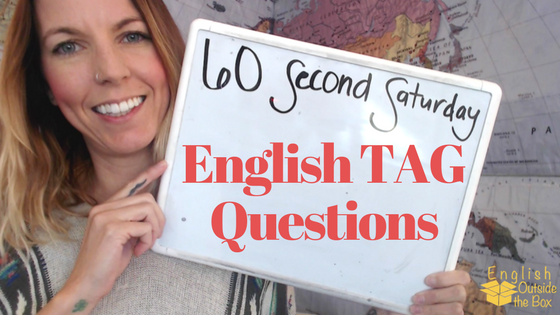
3 Ways to Use Tag Questions in English
You’re a busy English learner, aren’t you? Videos that are short but informative help you a lot, don’t they? You’ve been learning English with me for a while, haven’t you?
All of these questions include a tag question and show the 3 ways you can use tag questions in English. What are those 3 ways? Review this week’s 60 Second Saturday video to find out!
Below the video you can read the lesson notes and complete your practice exercises.
3 Ways to Use Tag Questions in English
1. Confirmation of Information
We can use tag questions as a way to confirm information that we already know (or think we know) is true. First, we say the statement that we think is true, and then we add the tag to “double check” or confirm what we said.
- You’re a busy English learner, aren’t you? ⇒ I think that you are a busy learner. This is information that I believe is true. However, I am confirming that statement with the tag, “aren’t you?”
- You don’t live in my city, do you? ⇒ In this example, I think that you live in a different city than me. I believe we live in 2 different cities. However, I want to confirm this with a tag question.
Notice that both of the examples above utilize the same auxiliary verb in the statement and the tag. The auxiliary verbs must always match. Additionally, if we have a positive (affirmative) statement, then we have a negative tag [sentence #1]. If we have a negative statement, then we must have a positive tag [sentence #2].
2. Comment on a Situation
We can also use tag questions to make generalized comments about a situation. This type of tag is incredibly common and useful for small talk and starting/maintaining a conversation with someone in English. It’s very common to comment on the situation you are in (the weather, the place, the event, or your general surroundings). Additionally, you can make a comment about something that is popular and happening in your city, or nationally/internationally on the news. **If you’re using tags for small talk – stay away from controversial news topics!**
- Videos that are short but informative help you a lot, don’t they? ⇒ This tag is making a comment about something that is relevant to you (the reader) and me (the writer/speaker). I am giving you a short but informative video, and you are reviewing it. So this is the present situation for the two of us.
- That was a great baseball/soccer/football game last night, wasn’t it? ⇒ If a local team played an exciting game, or you and the person you’re talking to share a sports interest, then this is a great statement + tag conversation starter.
3. Get New Information
Sometimes we don’t know information when talking to another person, and we want to ask it in a different way, different than a regular yes/no question. We can use tag questions in the same way we use a yes/no question to get answers from the people we are talking to. The biggest difference in this type of tag is going to be in your intonation. Similarly, when you ask a yes/no questions, your voice is going to go up in pitch.
- You’ve been learning English with me for a while, haven’t you? ⇒ Are you a new English Outside the Box learner? Have you been learning with me for a while? I am not sure, so instead of asking, “Have you been learning English with me for a while?” I can make a statement and add a tag like in this example.
- You didn’t learn French before learning English, did you? ⇒ Did you learn French before English? I am not sure – so I can ask you with a tag!
Practice Makes Perfect
Review the following statements utilizing each of the 3 ways above. Can you turn them into a statement + tag?
1. It’s very hot today!
2. You subscribed to this channel.
3. You have lived abroad.
To practice even more, try writing some questions to ask me!
You can also review the 5 Minute English video lesson + blog post on Understanding Tag Questions here.
Happy Studying! ♥
Do you know someone studying English and who needs help with tag questions or other English grammar points? Share this lesson with them!

[…] talked about in this lesson was tag questions. Read this lesson to practice more […]